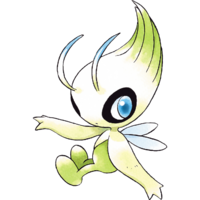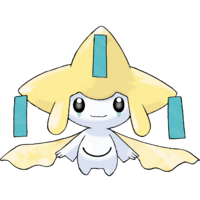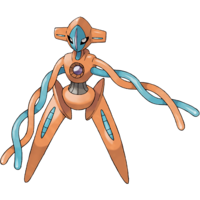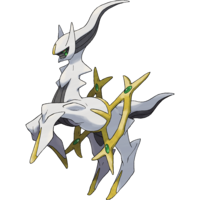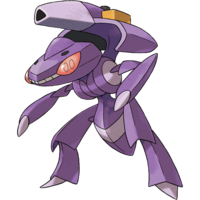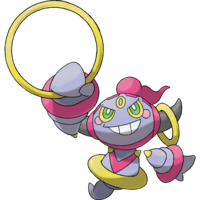Mythical Pokémon
Mythical Pokémon (Japanese: 幻のポケモン Illusory Pokémon) are a group of Pokémon seen so rarely in the Pokémon world that some question their very existence. This category mostly consists of event Pokémon, with the exception of Deoxys. Mythical Pokémon were considered to be Legendary Pokémon prior to Generation V in non-Japanese media, but are now considered a separate, related group of Pokémon.
Overview
Mythical Pokémon are regarded as among the rarest in Pokémon world mythology. Some are seemingly unknown to most people, while others are thought of as stuff of legends. They typically receive minimum exposure during normal gameplay, usually being revealed to players months or years after the debut of their respective generation. Upon being revealed, they are celebrated across the numerous media, often starring in movies and being featured prominently in merchandise. They are distributed to players in special occasions such as screenings of Pokémon movies, events in retail stores, online distributions, or spin-off games that feature special connectivity. No Mythical Pokémon is required to complete the Pokédex.
List of Mythical Pokémon
Generation I
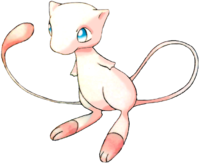
Mew
Mew (Japanese: ミュウ Mew) is a Psychic-type Pokémon known as the New Species Pokémon. It is believed to contain the genetic codes of all Pokémon in its DNA. Initially thought to be extinct, a scientific team has reported sightings of it in Guyana. Mewtwo was created after a series of experiments based on Mew, and is thus considered to be part of a legendary duo with it.
Mew established the convention of Mythical Pokémon with its release in Pokémon Red and Green. Its base stat total of 600 and stat distribution of 100 to each stat also created a trend followed by several Mythical Pokémon released later in the series. Pokémon following this trend include Celebi, Jirachi, Manaphy, Land Forme Shaymin, and Victini.
Designed by Shigeki Morimoto, it was initially unavailable and unknown to players, before being revealed by Satoshi Tajiri in the spring of 1996 in an issue of CoroCoro Comic. Initially, a lottery was held to distribute the Pokémon experimentally to a limited number of players, and a promotional card was included in the January issue of CoroCoro Comic. Supposed methods of obtaining Mew, passed on through word-of-mouth, contributed to the success of the Pokémon series. Its success was mirrored in the west with the eventual release of Pokémon Red and Blue, making Mew a prominent character of the first generation, co-starring in the first animated movie, Mewtwo Strikes Back.
Generation II
Celebi
Celebi (Japanese: セレビィ Celebi) is a dual-type Psychic/Grass Pokémon known as the Time Travel Pokémon. It is referred to as the guardian of forests, protecting and nourishing them as it travels through time.
Celebi shares a special connection with the Ilex Forest in Johto and the [[Agate Village's Relic Forest in Orre, having the Ilex Forest Shrine and the Relic Stone as monuments to honor it in those areas.
Introduced in Gold and Silver, Celebi was the second Mythical Pokémon to be released. Created by Ken Sugimori, it was dubbed the "New Mew" soon after being revealed because of its similar size and stats with Mew, as well as the status of being the last in the National Pokédex as of its generation and being unobtainable through normal gameplay. It first became available in Nintendo Space World 2000 in Japan, with numerous other events coming in the following years worldwide.
Celebi was the first Mythical Pokémon to obtain an in-game event in Pokémon Crystal, through the GS Ball key item, which was distributed over Pokémon Mobile System GB.
It starred in the fourth Pokémon movie, Celebi: Voice of the Forest, and appeared again with a central role in Zoroark: Master of Illusions.
Generation III
Jirachi
Jirachi (Japanese: ジラーチ Jirachi) is a dual-type Steel/Psychic Pokémon known as the Wish Pokémon. It is said to able to grant any wishes written on the tags on its head once awake. It only wakes up for seven days once every thousand years. If in danger, it will fight without waking up.
Jirachi was introduced in Pokémon Ruby and Sapphire and succeeded Mew and Celebi as a Psychic-type, base 600 Mythical Pokémon. It was revealed in 2003 in the context of the sixth movie, Jirachi: Wish Maker, in which it starred. It first became available in Japan to players who pre-ordered tickets to the movie, with other limited distribution events following throughout the year. Its distribution in the west was altered, as it was included in the Pokémon Colosseum Bonus Disc in the United States and in Pokémon Channel in Europe and Australia. Unlike its predecessors, Jirachi does not have an extensive story or event in the core games, with its lore limited to a few indirect references.
Jirachi is heavily connected to the real-world Japanese festival of Tanabata, with several distributions occurring in celebration of the event.
Deoxys
Deoxys (Japanese: デオキシス Deoxys) is a Psychic-type Pokémon known as the DNA Pokémon. It mutated from a space virus when exposed to a laser beam. It is able to change its form, altering its appearance and traits. The crystal on its chests acts as its brain, as well as a defense mechanism.
Although it retained a base stat total of 600, Deoxys was the first Mythical Pokémon to have a base stat distribution other than 100 in every stat. Additionally, Deoxys introduced the concept of Formes which altered the distribution of stats.
In spite of being included in the preceding games, Pokémon Ruby and Sapphire, Deoxys was first made available in Pokémon FireRed and LeafGreen. Officially revealed in late 2003 as a leading character in Destiny Deoxys, players were first able to capture Deoxys by use of the Aurora Ticket, which provided access to Birth Island, where it appears in-game.
While Deoxys originally had little impact on the story of Generation III, Omega Ruby and Alpha Sapphire introduced the Delta Episode, a mission following the player's first completion of the Hoenn League in which the player must stop a meteor from hitting the planet by destroying it with a befriended Rayquaza, revealing a Deoxys within. This marked the first and so far only time a Mythical Pokémon was available in-game without the need to attend an event or use a download code.
Contrary to its classification in Pokémon Omega Ruby and Alpha Sapphire, PokémonCenter.com notably calls Deoxys a Legendary Pokémon rather than a Mythical Pokémon, creating some confusion over its official designation.
Generation IV
Manaphy and Phione
Phione (Japanese: フィオネ Phione) is a Water-type Pokémon known as the Sea Drifter Pokémon, and Manaphy (Japanese: マナフィ Manaphy) is a Water-type Pokémon known as the Seafaring Pokémon. Phione live in warm seas, using the inflation sac on their heads to search for food and to drift in packs, always returning to the place of their birth. Manaphy are born on cold seafloors, also swimming great distances to return to their birthplace, and are born with a wondrous power to bond with any kind of Pokémon. Together, these two Pokémon species make up a Mythical duo of a parent and child.
Manaphy and Phione have the unique ability among Mythical Pokémon to breed with Ditto in captivity to produce Phione. Phione, cannot, however, evolve into Manaphy. The only legitimate way to obtain a Phione in-game is to breed a Manaphy or another Phione. Phione is the weaker of the two Pokémon, having 80 distributed into each stat instead of 100.
Phione's status as a Mythical Pokémon is disputed, with even official sources contradicting one another. Further information can be found here.
Manaphy was first made available to those who pre-ordered tickets for Pokémon Ranger and the Temple of the Sea in Japan. Anyone who pre-ordered tickets received a voucher which could be redeemed from June 17 to August 31, 2006 to access Pokémon Ranger's Ranger Net mission, "Recover the Precious Egg!". Once completed, a Manaphy egg could be transferred to Diamond and Pearl and hatched. This mission was later made available to other areas of the world, and Manaphy has since been released through distribution as most other Mythical Pokémon.
Darkrai
Darkrai (Japanese: ダークライ Darkrai) is a Dark-type Pokémon known as the Pitch-Black Pokémon. It chases people and Pokémon away from its territory by causing them to experience deep, nightmarish slumbers. However, it is merely protecting itself, and means no harm. It is particularly active on moonless nights.
Darkrai is heavily connected with the status condition of Sleep, as reflected by its signature ability, Bad Dreams, and its signature move Dark Void. It is also capable of learning the move Nightmare to inflict additional damage to sleeping opponents.
Darkrai has appeared with an antagonistic role in Pokémon Mystery Dungeon: Explorers of Time and Explorers of Darkness and Pokémon Mystery Dungeon: Explorers of Sky, specifically as an enemy of the Legendary Pokémon Cresselia. In Pokémon Diamond and Pearl, and Pokémon Platinum, the player must also cure Sailor Eldritch's son of a nightmare using a Lunar Wing from Cresselia. The two Pokémon's relationship is further cemented in the anime episode Sleepless in Pre-Battle!, in which Cresselia is revealed to actively drive Darkrai away from Canalave City. Collectively, the two Pokémon are known by a fan designator, the lunar duo.
Darkrai was officially revealed February 2007, and was first made available to those who owned Pokémon Diamond and Pearl and watched Pokémon: The Rise of Darkrai in Japan from release to September 9, 2007. Other distributions were made available afterwards. Notably, in Pokémon Platinum, an event gave the Member Card to players over Nintendo Wi-Fi Connection, activating an in-game event which allowed for capture of Darkrai on Newmoon Island.
Shaymin
Shaymin (Japanese: シェイミ Shaymin) is a Grass-type Pokémon known as the Gratitude Pokémon. Shaymin live in flower patches and avoid detection by curling up to look like a flowering plant. Shaymin are able to dissolve toxins in the air to transform ruined land into a lush field of flowers. When sensing gratitude, the flowers all over its body burst into bloom.
When exposed to the blooming Gracidea flower during the daytime, Shaymin becomes Sky Forme Shaymin. Sky Forme has altered stats from its original Land Forme and takes on the Flying-type type as a secondary type. Shaymin will revert into its Land Forme at night, while frozen, or when deposited into the Pokémon Storage System.
Shaymin was officially revealed in February 2008 as a star of Giratina and the Sky Warrior, and in early June 2008, its Sky Forme was revealed. Shaymin was first made available to owners of Pokémon Pokémon Diamond and Pearl during the theatrical showing of the movie in Japan from July 19 to September 30, 2008. Other distributions were later made available, but a notable distribution occurred for North American and PAL players from September 28 to November 8, 2009 through distribution of the key item Oak's Letter. This item allowed players to access Seabreak Path and capture a Shaymin in Flower Paradise.
Arceus
Arceus (Japanese: アルセウス Arceus) is a Normal-type Pokémon known as the Alpha Pokémon. According to mythology, Arceus emerged from an egg before the universe even existed, then shaped the world with its 1,000 arms.
Arceus is said to have created the regions of Sinnoh and Ransei, and may have created the entire Pokémon universe. According to legend, Arceus also created two legendary trios. First, it created the creation trio: Dialga, Palkia, and Giratina, to balance time, space, and antimatter. Then, it created the lake guardians: Uxie, Mesprit, and Azelf, and created spirit. As their creator, it is both trios' trio master. It is unique in this regard, as it is the only Mythical Pokémon to be the master of a Legendary trio, and the only Pokémon to be the master of two.
Arceus is often referenced in Sinnoh's mythology as the "Original One". Both Canalave City's library and the Plates scattered across Sinnoh describe Arceus' creation of the universe. It receives more exposure in-game than Mythical Pokémon traditionally find.
Arceus' signature ability, Multitype, allows it to change its form and type depending on which plate it holds. This will also change the type of its signature move, Judgment.
Arceus was officially revealed on February 14, 2009, and first made available to players on July 18 of that year, the day when Arceus and the Jewel of Life premiered in Japan. Arceus was revealed to international audiences on August 3, 2009.
Generation V
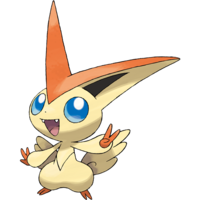
Victini
Victini (Japanese: ビクティニ Victini) is a dual-type Psychic/Fire Pokémon known as the Victory Pokémon. It is said that this Pokémon brings victory, and that trainers with Victini always win, regardless of the type of encounter. It creates an unlimited supply of energy inside its body, which it shares with those who touch it. When it shares the energy it creates, that being's entire body will be overflowing with power.
Victini is notable for appearing before the starter Pokémon of its debut generation, giving it the Unova Pokédex number #000, a first in the Pokémon series.
Victini was revealed in a preview for the fourteenth Pokémon movie which was shown at the end of Zoroark: Master of Illusions. It was made available in-game by use of the Liberty Pass, an event item which was distributed across varying time periods worldwide. The Liberty Pass allowed players to travel to Liberty Garden. Once there, the player would be challenged by members of Team Plasma, and could find Victini in the basement of the lighthouse.
Keldeo

Keldeo, the second Mythical Pokémon of Generation V. Keldeo, the Colt Pokémon, is the fourth member of the Swords of Justice, alongside legendary Pokémon Cobalion, Terrakion and Virizion. Its initial appearance in Pokémon Black and White as well as the default in Black 2 and White 2 is its Ordinary Form. In Black 2 and White 2, Keldeo has a second form, its Resolute Form. After triggering an event in the Pledge Grove, Cobalion, Virizion, and Terrakion will teach Keldeo Secret Sword. It will remain in its Resolute Form as long as it knows Secret Sword.
Keldeo debuted in the fifteenth Pokémon film Kyurem VS. The Sword of Justice, along with the other Swords of Justice.
Meloetta

Meloetta, the third Mythical Pokémon of Generation V, represents music (Aria Forme) and dance (Pirouette Forme). Legend says that it once sang and danced joyfully. However, when sorrow darkened the world, it lost the melody and its red shoes. Using Relic Song changes its form.
Meloetta made its anime debut in PK23. It made its TV debut in An Epic Defense Force! (in Aria Forme) and Expedition to Onix Island! (in Pirouette Forme).
Genesect
Genesect is an ancient insect Pokémon who was feared as the strongest of hunters more than 300 million years ago. Team Plasma revived it from a Fossil and altered it with cybernetic upgrades in an attempt to create the strongest Pokémon in existence. It uses special Drives to make variations to its signature move, Techno Blast. It is the final Mythical Pokémon of Generation V.
Genesect had its anime debut in a group called the Genesect Army that had escaped from Team Plasma's P2 Laboratory. They were first seen in N visions in The Name's N!, and later on starred in the sixteenth Pokémon movie Genesect and the Legend Awakened, in which they battled Mewtwo in New Tork City.
Generation VI
An additional three Mythical Pokémon were added in Generation VI, 15 Mythical Pokémon (16 when including Generation IV's Phione).
Diancie
Diancie, the Jewel Pokémon, is the first Mythical Pokémon introduced in Generation VI. It is a Rock/Fairy type, and can create diamonds to protect itself.
Diancie appeared in Diancie and the Cocoon of Destruction, where it is the princess of the Diamond Domain. It is given the objective to create a new Heart Diamond for the domain, as the current one is faltering, and seeks Xerneas and its Fairy Aura to gain the power to do so. It is sought after by multiple thieves who desire its diamonds, and ultimately gains the power to make a Heart Diamond in an attempt to protect its friends from Yveltal. It appears with three Carbink servants and an elder Carbink named Dace.
It has the ability to Mega Evolve into Mega Diancie.
Hoopa
Hoopa is the second Mythical Pokémon introduced in Generation VI. It has two formes. Hoopa Confined, the Mischief Pokémon, is a Psychic/Ghost type, whilst Hoopa Unbound, the Djinn Pokémon, is a Psychic/Dark type. It is said to be able to be able to warp space in order to take things it likes and carry them away into alternate dimensions. It is also said to have carried away an entire castle in an attempt to steal all of its treasure according to some legends.
Hoopa appeared in Hoopa and the Clash of Ages in both its Confined and Unbound forms.
Volcanion
Volcanion, the Steam Pokémon, is the third and final Mythical Pokémon introduced in Generation VI. It is a Fire/Water type Pokémon that uses steam from arms on its back to disappear in fog and blow away mountains. It lives in mountains uninhabited by humans.
It is currently unavailable in the Pokémon games, and thus has not yet been featured in the anime, although it will act as one of the main stars of M19.
Trivia
- Manaphy is the only Mythical Pokémon that can breed, and also not a member of the Undiscovered Egg Group.
- While the first Mythical Pokémon, Mew, was added to the original games right before release, the concept of "illusory monsters" (Mythical Pokémon) already existed in Satoshi Tajiri's pitch for Capsule Monsters. Some of them were said not to be catchable, and some not even encounterable. As an example, there would be a "Green Dragon" that could only be found rarely in a specific area of a dungeon, and it would have taken around 2 hours to find and catch.[1]
In other languages
| ||||||||||||||||||||||||||||||||||||||||||||||||||||||||||||||||


